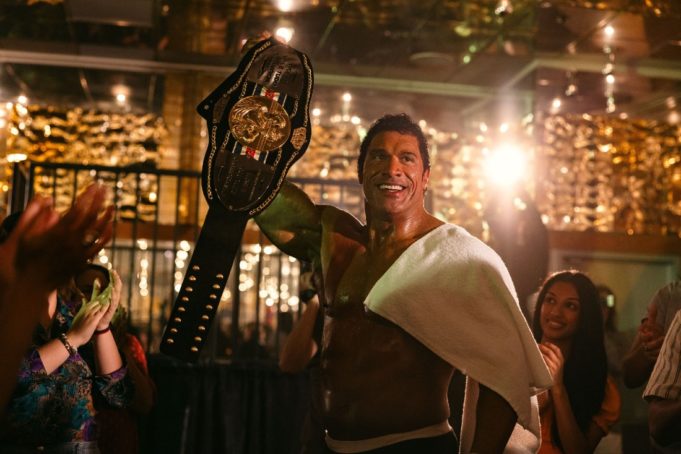What is it with filmmaking siblings splitting up these days? The Coen brothers needed a vacation from each other, the Wachowski siblings went their separate ways, the Duplass brothers couldn’t stay together, and now Benny Safdie has gone solo after he and his brother Josh made Good Time and Uncut Gems together. None of these have resulted in the solo sibling making better movies on their own, for my money. I’m sad to say that Benny’s film on his own, The Smashing Machine, joins that company, despite succeeding at showcasing The Rock.
Dwayne Johnson portrays Mark Kerr, who’s an ultimate fighting champion when the story picks up in the late 1990s. His efforts in the ring — not an octagon yet — have bought him a nice house that’s not quite a mansion in Scottsdale, Ariz. for himself and his live-in girlfriend Dawn Staples (Emily Blunt). However, he goes into a tailspin after his first professional loss at Pride 7 in 1999, even though the loss is later overturned due to a lack of clarity over the rules. That’s what’s clouding his mind as he prepares for the 2000 Pride Grand Prix, an openweight tournament in Tokyo whose grand prize is the unheard-of amount of $200,000.
I appreciate that Safdie does not want to make a traditional sports movie here, as MMA fans and those who watched the 2002 documentary about Kerr that was also entitled The Smashing Machine already know that Mark will lose the biggest fight of his career. The problem with his approach is that Safdie never clearly establishes what this movie is. We’re meant to identify with Mark’s struggles outside the ring, but many other films (The Wrestler comes to mind) have done better at showing the toll that combat sports take on the body and the psyche. Mark is hooked on opioids, but the movie shows us nothing about his stint in rehab, and while his friend and fellow fighter Mark Coleman (played by real-life MMA fighter Ryan Bader) tells him that he has a problem, the friendship isn’t given enough weight.
The points of tension between Mark and Dawn aren’t scripted well enough to carry the story, either — when Dawn tries to kill herself during the climactic domestic argument, it comes out of the blue. Then, too, we’re not given enough of a portrait of the humbler beginnings of a sport that has since ballooned in popularity. The Smashing Machine focuses so much on Johnson’s performance that it comes off as an audition tape rather than a movie.
That said, it’s quite a good audition tape. If the movie’s prosthetics workers (headed by Kazu Hiro, who is credited in the opening credits) successfully make The Rock look unlike himself, Johnson also changes his delivery and modulates his voice to sound unlike himself. He turns Kerr into a soft-spoken and charming man when dealing with the public, and he acquits himself quite well in Mark’s arguments with Dawn. For all its shortcomings, this movie is about 100 times more interesting than The Jungle Book, the other movie that Johnson collaborated on with Blunt.
You won’t be surprised that he does well with the fight sequences, too, but even those let the star show us something new, as Mark is disguising his fighting moves as opposed to pro wrestlers like Johnson, who are supposed to telegraph their moves. If The Smashing Machine does have a story hook, it comes at the very end after Mark definitively loses for the first time and then starts laughing in the shower afterwards when he realizes that the world hasn’t fallen in on him. Johnson makes that moment, too. The previous generation of super-muscled Hollywood action heroes never ventured far or successfully out of their narrow comfort zones, but this new generation minted by WWE and UFC that includes John Cena and Dave Bautista as well as Johnson have proven themselves to be far more versatile as actors. It’s good to have them. If this is a springboard for The Rock to take on more complex roles, I say bring it on.
The Smashing Machine
Starring Dwayne Johnson and Emily Blunt. Written and directed by Benny Safdie. Rated R.












